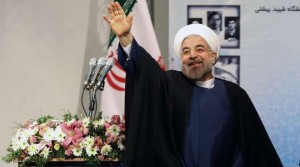 President Obama and President Hassan Rouhani of Iran both spent time last weekend trying to sell the Iran nuclear deal to skeptics among their constituents.�In Mr. Obama�s case, that meant addressing pro-Israel supporters at the Saban Center for Middle East Policy, a Washington think tank. Mr. Rouhani�s speech to a university audience in Tehran was televised nationally. While either side could undermine the November interim agreement, and with it the best chance in 30 years for a genuine thaw in Iranian-American relations, the more serious threat seems to be on the American side.
President Obama and President Hassan Rouhani of Iran both spent time last weekend trying to sell the Iran nuclear deal to skeptics among their constituents.�In Mr. Obama�s case, that meant addressing pro-Israel supporters at the Saban Center for Middle East Policy, a Washington think tank. Mr. Rouhani�s speech to a university audience in Tehran was televised nationally. While either side could undermine the November interim agreement, and with it the best chance in 30 years for a genuine thaw in Iranian-American relations, the more serious threat seems to be on the American side.In the agreement, Iran committed to freezing or rolling back parts of its nuclear program and allowing daily inspections for six months in exchange for modest sanctions relief. In the meantime, negotiators for both sides will work toward a more lasting agreement. While not perfect, the six-month hiatus is unquestionably a good deal and would put the first meaningful curbs on Iran�s program in a decade. It certainly beats military action, which Mr. Obama holds out as an option if negotiations fail.
In recent days, however, reports have circulated in Washington that two members of the Senate � Robert Menendez, a Democrat, and Mark Kirk, a Republican �are preparing legislation�that would impose new sanctions on Iran�s remaining exports and strategic industries if, at the end of six months, the interim agreement goes nowhere. Both Iran and the White House have warned that such legislation could be fatal to the agreement. Mohammad Javad Zarif, Iran�s foreign minister, told Time and The New York Times in an interview in Tehran on Saturday that �the entire deal is dead� even if the penalties do not take effect for six months.
Similar mischief is afoot in the House. The Washington Post�reported�that Steny Hoyer of Maryland, the Democratic minority whip, was working with Eric Cantor, the Republican majority leader, on a resolution that could sharply limit the outlines of a final agreement or call for imposing new sanctions.
Mr. Hoyer�s office described as �preposterous� the notion that he would sign on to any resolution that would undermine the White House. But even a hint that he and other House Democrats might join with hard-line Republicans against Mr. Obama on what amounts to a diplomatic breakthrough is alarming.
The outcome of these efforts is unclear. What is clear is that they are not only unproductive but unnecessary because Congress could, at any point in the future, order tougher sanctions if any deal falls apart. Equally clear is that they will almost certainly enrage the Iranians. The interim deal stated that no further sanctions should be imposed while it was in force. New penalties would betray that agreement, feed Iranians� deep mistrust of Americans, deny Mr. Obama negotiating flexibility and, most likely, crush any hope that a diplomatic solution is possible.
By The News York Times
The Iran Project is not responsible for the content of quoted articles.










